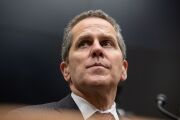
NEW YORK — Acting Comptroller of the Currency Michael Hsu said there is "strong alignment" between federal regulators about the need for stronger capital requirements in the banking system.
Hsu's comments were delivered during a
"Having strong capital requirements is important. It can help promote the economy, ensure a safe and sound banking system and that is in the interest of everyone," Hsu said. "You don't want to be pennywise and pound foolish with those requirements."
The reforms outlined by Barr on Monday lined up closely with what regulators had been signaling for months. The bulk of changes would be tied to the
Barr also confirmed the industry's assumption that more onerous regulatory requirements would be applied to midsize and regional banks, those affected most acutely by this spring's banking crisis. He called for risk capital charges and long-term debt requirements to be applied to all banks with $100 billion of assets or more, instead of the current minimum of $700 billion.
The Fed estimates that the changes would result in an average increase of capital 2% across all impacted banks, with the majority of that coming from the largest banks in the country.
Hsu said it was too early to say exactly how the impact of these new requirements would be distributed within the banking system. Regulators must first develop the proper framework then turn their attention to mitigating unintended consequences, he said.
"The important thing is that we get the requirements right and so that's really where the focus is," Hsu said. "What is the burden going to be either on specific institutions [or] on particular markets, that's all part of the analytical process, which is fed into how we're approaching this. And of course the comment period will provide us with even more information as to where we should go in terms of finalizing things."
In discussing the need for enhancing capital standards for banks with between $100 billion and $250 billion, Barr pointed to the failures of Silicon Valley Bank, Signature Bank and First Republic Bank as evidence that banks in that range could have systemic impacts when they fail. He also pushed back against the idea that their failures were not directly tied to capital.
"Some industry representatives claim that inadequate capital had nothing to do with those bank failures. I disagree," Barr said. "It was an unsuccessful attempt by SVB to raise capital that caused uninsured depositors to look more closely at how the bank was capitalized."
But Hsu said that while the capital changes discussed Monday would address some of the shortcomings related to the three failed banks, these new requirements should not be viewed solely as a response to recent distress in the banking system.
"With those requirements, we're playing the long game. At the same time, we have a current situation which is informed by a lot of different things, and so we have to do both," Hsu said. "I wouldn't necessarily link where those requirements are going to land with the current situation, but obviously with this current situation, we're coming out of a pandemic, we just had some stress in the banking system not too long ago. So all of these are top-of-mind."
During the live-streamed event, Hsu also addressed federal policies around mergers, a topic that has been discussed frequently in relation to the recent banking crisis. A longtime skeptic about large banks becoming "too big to manage," Hsu said it was important to strike a balance between controlling the growth of certain banks without shutting down expansion across the board.
"You need diversity and you need a safe and sound banking system. Healthy mergers can support both of those. Unhealthy mergers can hurt that," he said. "In my mind, there's a clear distinction between healthy mergers and unhealthy mergers, and we need to allow healthy mergers and we need to discourage and prohibit unhealthy mergers."
Hsu also addressed one acquisition in particular: JPMorgan's purchase of First Republic Bank after the latter was shuttered by regulators in May. The move, which caused JPMorgan's share of national deposits to go above the 10% cap, has
Hsu said it was important to address "excessive concentration" in the banking industry and find ways to foster more competition. But ultimately, he stands by his decision to approve the deal, noting that it was in the best interest of financial stability to find a suitable buyer for First Republic before markets opened that Monday.
"In situations where you've got large banks failing and financial stability is at risk, financial stability has to come number one, number two and number three," Hsu said. "When faced with those decisions, ensuring there's coordinated and timely government action to ensure financial stability is always going to be my top priority."






